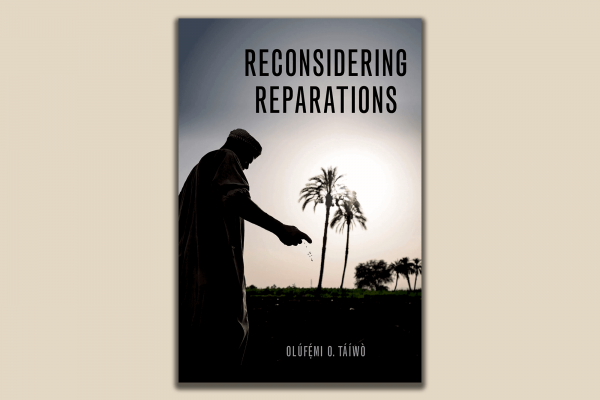IN A FORMER job, I traveled to farms scattered around the world searching for coffee beans to make espresso drinks for Western consumption. I became intimately aware of the complex origins of something as seemingly simple as a cup of coffee and witnessed firsthand the currents of a worldwide distribution system that transfers surplus value from the Global South to the Global North.
In Reconsidering Reparations, Olúfémi Táíwò, an assistant professor of philosophy at Georgetown University, describes the history of this system and how it contextualizes discussion of reparations. Colonialism and trans-Atlantic slavery, what he terms the “global racial empire,” created the world and the complex web of social and economic relations we inhabit today. This system has resulted in an accumulation of safety, education, food, health care, and opportunity in Western countries and insecurity and precarity in the Global South. Táíwò argues this history is “not simply a point of comparison to the present. It is a way to map the currents that engulf us in the present.”
Unsurprisingly, these currents extend to the vulnerabilities occasioned by climate change. The metrics most equated with human flourishing—life expectancy, maternal mortality rates, dietary adequacy, literacy rates, sanitation accessibility, and “government effectiveness” (civil liberties, political rights, and governing accountability)—are significantly worsened by a country’s history of colonization and intensified by climate change. Climate justice and racial justice turn out to be the same project, in response to the same political history of global racial empire.
Enslaved people, abolitionists, and allies alike have demanded reparations since at least the 1700s. These have culminated in a conversation between two perspectives, which Táíwò terms the “harm-repair” and “relationship-repair” arguments. The harm-repair view benefits from the legal precedent of restoring harms, such as a workplace injury, through the framework of “before and after.” However, it is ultimately incapable of accounting for the magnitude of the trans-Atlantic slave trade.
In contrast, the relationship-repair model concentrates on the moral wrongdoings of global racial empire with a target of restoring relationships. Reparations become formal acts of moral repentance. However, by centering the moral wrongs of slavery and colonialism—which are gargantuan—this view frequently fails to account for the material and structural deprivation they caused.
Táíwò instead argues for what he calls a constructive view of reparations, which is not primarily concerned with restitution or reconciliation within our current global system. He refuses to accept the starting point of reparations as integration into the burning house of global racial empire, arguing that achieving racial and climate justice will require building a different world and different web of relationships.
Táíwò does not pretend to give us a construction manual but rather a destination, a road map, and a playlist of ancestors who have struggled before us. The fruits of Táíwò’s project extend like tree branches, generating questions of Indigenous self-determination, the importance of history and temporality for radical struggle, the capitalist system of exploitative and extractive growth centered on infinite accumulation, and the complications of assessing strict group responsibility alongside our collective liability.
Reconsidering Reparations deserves deep engagement from students, scholars, and activists alike. History is of our making, which means we can and must change it.
Sojourners has partnered with Bookshop.org; when you order books through the links on sojo.net, Sojourners earns a small commission and Bookshop.org sends a matching commission to independent bookstores.

Got something to say about what you're reading? We value your feedback!







